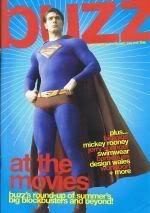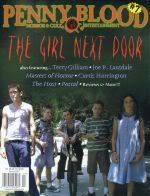Interview with Paul Solet
“The most common thing we do as horror fans is bitch, and no one seems to want to do anything about it. I just wanted to make sure I had earned my bitching rights.” It’s hard to think of a better reason to make movies. It’s also certainly about time someone did something about an increasing stale and tired genre, and it seems Paul Solet is determined to do it. “[Filmmaking] is the only thing I ever really wanted to do. Well, astronaut, too. And fireman. And bank robber. And werewolf…” Solet’s easy humour can’t quite disguise his resolve, and both attributes are paying off for him right about now: his hysterical horror short, Means to an End, is featured on this year’s Fangoria Blood Drive II compilation, as well as winning more awards than you can shake a stick at.
In his own words, the film’s pure “gun-and-run, old-school, guerrilla gore.” With characters based on himself and his best friend (and collaborator) Jake Hamilton, albeit with the insanity, thankfully, cranked up a few notches from reality, it’s not difficult to feel the raw enthusiasm coursing through the film. Handy, since, inevitably, it’s been made on a shoestring budget. “There was a whole hell of a lot of enthusiasm on that set. Everyone who became involved with Means caught that bug, even in post, which makes so much difference, especially if people aren’t getting paid.”
Despite being a bona fide film school graduate, Solet’s remarkably down to earth, and a keen proponent of actually getting things done, rather than just pontificating about it. As he puts it, “film school is great, but it is what you make of it. I can read about making movies until my eyes boil, but I don’t really internalise anything until I get my hands dirty.” Which, judging by Means, he takes quite literally – Solet spends most of the movie up to his elbows in gore. He’s self-motivated, sure, but then again he has to be – “the unmotivated film school student isn’t somehow a valuable commodity just because of a $100,000 slip of paper. If you can get yourself in the mix, and walk through the fear and chaos and periodic humiliation of learning the trade, then it doesn’t seem to matter a whole lot whether you have a degree or not.” Poetic as that may sound, the film industry is notoriously hard to break into; the difficulties do, at least, serve to separate the wheat from the chaff. “The people who don’t love what they’re doing seem to just fizzle out, move home, and talk shit about LA.” And the people who do love what they’re doing stick it out till they get somewhere, presumably.
Despite the rather dire portrayal of studio executives in Means to an End, in reality Solet’s not had such a hard time of it. “I’m grateful to be on the creative side of things. I wouldn’t look to that side of the business for creative validation or anything, but I’ve actually been pleasantly surprised at a few meetings. A handful of us fans seem to have infiltrated the system, and made it pretty far up the ladder.” One “fan” who’s had a particular influence, and is even quoted on the DVD cover for Means, is a familiar name around these parts. Solet recounts, “I had Eli Roth and his brothers for camp counselors when I was little. Eli used to direct the campers in these epic, shot on video, splatter fests, like “Sushi”, where all the campers turn on the counselors, maiming and mutilating them, and turning them into sushi, Mario Bava style.” A slightly off-kilter yet indisputably appealing mental image, not quite the kind of good, wholesome fun you’d expect kids at a summer camp to be having; though somehow amateur splatter fests slot in neatly alongside sports, sleepovers, toasting marshmallows over a campfire and telling ghost stories. It all makes a certain kind of sense. “Getting to know [Roth] made me realize that one might actually be able to do this for a living,” recalls Solet, “and watching him go out and do it sealed the deal.” (It might be easier to conveniently forget, at this point, the kind of difficulties Roth faced in getting Cabin Fever made in the first place.) The successes of his erstwhile camp-buddy provided one kind of inspiration, but as Means to an End clearly demonstrates, a wide range of horror movies supplied the rest. Solet has a long list of favourites that he’s reluctant to trim for the sake of a succinct interview answer – “I always want to break it down to sub-genres – best gore: Cannibal Holocaust, best slasher: New York Ripper, best monster movie: Alien etc. John Carpenter’s The Thing is still my favourite scary movie.” As if that wasn’t enough, he continues; “Aliens ripped my brain to shreds, too, when I was little. And Audition is a fucking masterpiece.”
When asked who he’d like to work with, given the opportunity, he’s equally exuberant: “I’d love to co-write a couple of Twilight Zone episodes with Richard Matheson, or get on location with Lucio Fulci for a shark vs. zombie battle.” And in more realistic terms? “I’d go with Takashi Miike.” There’s perhaps only one field in which Solet is able to give one decisive answer: when picking his favourite teen star, there’s only one name for him: “Olsen twins. Olsen twins. Olsen twins.” Okay, maybe two names.
In reality, Paul Solet’s not quite as rabid as his fictional counterpart in Means to an End, but equally, he doesn’t mince his words when it comes to film. He has some discerning tastes; he’s opinionated enough about what he likes and what he doesn’t, which hopefully translates into a filmmaking ability to know what’ll work and what won’t. Of the overuse of CGI trickery in recent movies, he explains: “you can’t replace plot with bells and whistles. If the script stinks, it’s just perfume on a pig, and a lot of the time, it’s really rank perfume, applied in great excess.” To that, uh, colourful metaphor, Solet adds, “sometimes I feel like I’m just watching someone I don’t know play a video game.” It’s obviously a sensation that’s at odds with his usual more hands-on approach.
Following the success of Means to an End, it seems pretty obvious he won’t be just watching for long – so what (aside from getting to hobnob with an array of jealousy-inspiring stars at much-anticipated genre film premieres) is next? Evidently not one to slack off, Solet’s got a range of irons in the fire right now: “I wrote a thriller called Heartland that was a winner at this year’s VisionFest in New York, and another script called Repeater, a body-horror script, which is a finalist in the First Glance Festival out here in Hollywood.” That’s all? “I’m moving into pre-production on a new short, too, called Grace, to generate financing for the feature length version.” Oh. Fair enough, then. Good to know. To borrow Means to an End’s tagline, “pain is temporary, film is forever.” If that’s true, Paul Solet’s set on building quite the legacy for himself.
IMDB link










No comments:
Post a Comment